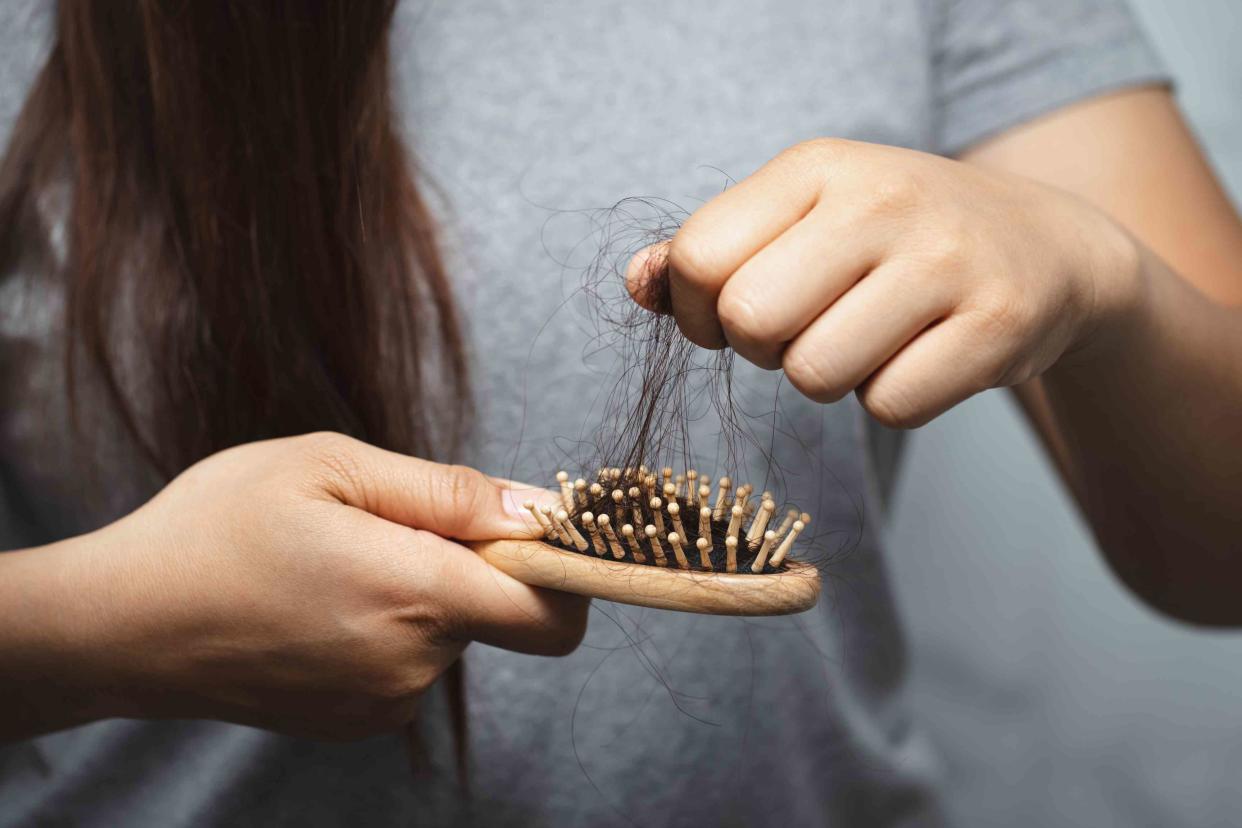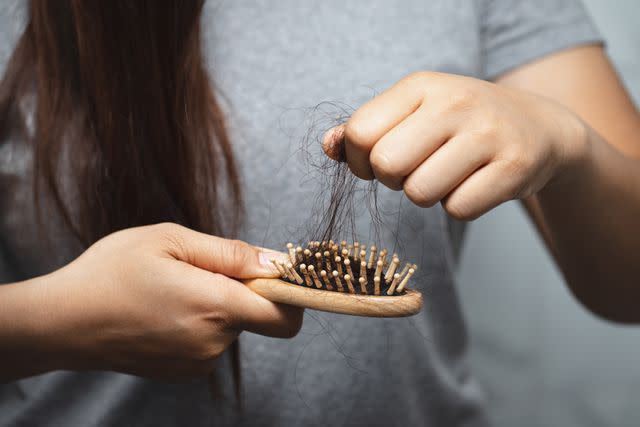The Beginning and End of Postpartum Hair Loss

boytaro Thongbun / 500px / Getty Images
Medically reviewed by Sanaz Ghazal, MD
A growing bump isn't the only outward sign you might notice during pregnancy. Surging hormone levels can change your hair texture and thickness. While this is often a welcomed effect, the reverse is common after delivery.
Many people experience hair loss after childbirth, but in rare cases, it could be a sign of another underlying problem.
Find out what to expect from your hair after delivery, how to nourish your locks to reduce postpartum hair loss, and when to see a healthcare provider.

boytaro Thongbun / 500px / Getty Images
Postpartum Hair Loss: When It Starts and Stops
Hair loss that occurs after delivery is called "pregnancy alopecia" or "telogen effluvium" (TE). TE is the name of non-scarring hair loss people may experience after physiological stresses like significant weight loss or pregnancy. Most cases of TE develop two to three months after a stressful event and resolve in about six months.
This is also true for postpartum hair loss. Excessive shedding or hair loss doesn't usually happen right after delivery. Instead, it begins a few months after delivery, often peaking around four months postpartum. Postpartum hair loss typically lasts a few months, though this varies from person to person. Most birthing parents see resolution by their baby's first birthday.
Hormones and Postpartum Hair Loss
Although stress can play a role in hair loss, shifting postpartum hormones are a significant factor.
Hair growth typically goes through three phases:
Typically, about 95% of your hair follicles are in the growing stage at any given time, but after pregnancy, about 60% enter the resting and shedding phases.
Estrogen (a sex hormone) influences your hair growth cycles and patterns. Estrogen levels are high during pregnancy, supporting the growth phase of the hair cycle. This is why your hair may appear thicker or healthier during pregnancy.
As estrogen returns to pre-pregnancy levels after you give birth, your hair enters the resting phase and begins to fall out. The balance of progesterone and prolactin (other reproductive hormones) significantly shifts during pregnancy and can impact hair growth and shedding,
Other hormones that play a role in hair growth cycles include:
Thyroid hormones
Melatonin
Testosterone
Dihydrotestosterone
Dehydroepiandrosterone sulfate (DHEAS)
Androstenedione
Corticotropin-releasing hormone (CRH)
Adrenocorticotropic hormone (ACTH)
Cortisol
Thyrotropin-releasing hormone (TRH)
Galanin
Pregnancy, postpartum, and other forms of emotional or physical stress can alter the balance of these hormones.
Other Causes of Hair Loss
If you experience significant, prolonged postpartum hair loss, talk to a healthcare provider about potential underlying causes. Some common causes of hair loss outside of the postpartum period include:
Family history of hair loss disorders
Damaging hairstyles or products
Psoriasis
Infections
Certain medications
Does Postpartum Hair Loss Go Away Naturally?
Postpartum hair loss usually begins a few months after delivery, often lasting between six and 24 weeks. In rare cases, postpartum hair loss can last up to 15 months. However, if you still experience significant hair loss after your baby's first birthday, talk to a healthcare provider who can rule out any other contributing factors.
Once your hormone levels balance out and your hair resumes its regular growth pattern, achieving your pre-pregnancy hair quality can take some time. Many people regain their normal hair fullness about a year after delivery.
Hair Care During Postpartum Hair Loss
Gentle hair care can help slow postpartum hair loss. Adopt one or more of the following habits to care for your hair postpartum:
Avoid tight hairstyles
Avoid blow-drying and heat styling
Use a volumizing shampoo
Avoid heavy conditioners that can weigh your hair down
Concentrate conditioner application on the ends of your hair
Whole-Body Nourishment for Postpartum Hair Loss
Your overall health and nutrition affect your hair health, too. People who experience nutritional complications like anemia, gestational diabetes, and thyroid disease are more likely to experience hair loss, according to several studies.
Eating a balanced, healthy diet and discussing vitamins or supplements are all options to help promote healthy hair. Some common supplements that promote hair growth include:
If breastfeeding or pumping, talk to a healthcare provider before taking any new vitamins. You may also want to discuss your overall nutrition with your healthcare provider since hair loss caused by anemia related to your pregnancy may require additional treatment and monitoring.
Read Next: The Best Skin & Hair Products
Postpartum Hair Loss Not Improving
Everyone loses hair—between 50 and 100 strands daily. It can be challenging to estimate a count for daily hair loss, but if you feel like your hair is thinning or you are losing more hair than usual for a year or more, talk to a healthcare provider. It's important to rule out medical conditions like thyroid disease contributing to hair loss.
Summary
Postpartum hair loss can be frustrating, especially alongside all the other physical and emotional changes you are going through. In most cases, postpartum hair loss is temporary, lasting only about six months to a year after delivery. Hair loss that lasts longer could result from a more complex medical condition. If you experience prolonged postpartum hair loss, schedule an appointment with a healthcare provider for additional testing.

